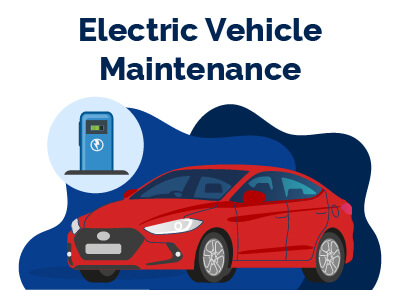Electric Vehicle Maintenance (Everything You Need To Know)
June 5, 2023


Chris is Head of Content for FindTheBestCarPrice and is based out of Philadelphia, PA. As a seasoned automotive industry analyst and car enthusiast, he ensures the highest level of quality across all our content and curates our picks for the best deals each month.
Chris studied information systems and marketing at Drexel University and writes about a wide range of topics ranging from car buying tips to troubleshooting common mechanical issues.
When he’s not thinking about cars, he likes to stay in with his dog and make an “attempt” to finish a crossword puzzle (he’s not quite at the Saturday/Sunday level…yet). As a former cheesemonger, Chris still has a “sharp” passion for all things cheese, and his fridge is always loaded with it!
Chris also has a passion for things that go fast, and drones are no exception. He spends some of his time writing for Dronesourced.
Electric vehicles (EVs) are the latest trend in town. The idea of driving without gas, no need for fuel, or worrying about the incessant repair needs of internal combustion engines, there are many reasons to admire and wish to own an electric vehicle.
While the idea of owning an electric vehicle sounds cool, a few questions should be running through your mind. Are electric vehicles cheaper to maintain? Are they prone to problems? What does electric vehicle maintenance look like?
The truth is that electric vehicles are cheap to maintain. They require less maintenance due to the fact that there are fewer parts in their system compared to internal combustion engines.
However, although electric vehicles are cheaper to maintain, there are a few worries surrounding their usage, like their reliability and the availability of technicians that can work on them.
In this article, we will discuss all you need to know about electric vehicle maintenance.
Table of Contents
- Are Electric Vehicle Maintenance Costs Higher?
- Do Electric Cars Require a Lot of Maintenance?
- Do Electric Cars Have a Lot of Problems?
- What Are the Common Problems With Electric Vehicles?
- Are Electric Vehicles Expensive To Maintain?
- What Maintenance Is Required for Electric Cars?
- How To Maintaining Electric Cars
- Why Are Electric Vehicles Not Reliable?
- Do Electric Vehicles Need Oil Changes?
- Do Electric Cars Wear Out Tires Faster?
- Conclusion
- Best Car Deals by Category
- Frequently Asked Questions
Are Electric Vehicle Maintenance Costs Higher?
No. Electric vehicles’ maintenance costs are not higher. In fact, considering real-time data, and our experience with electric vehicles, they are not even as expensive as maintaining a gas-powered vehicle.
EVs require regular maintenance, just like their gas-powered counterparts, but the cost of maintaining them is very low.
Most times, the only money you will spend to keep your electric vehicle running is the cost of charging the vehicle.
With electric vehicles, you are bothered about the cost of changing the oil, spark plug replacement, coolant flushing, or servicing the transmission. This drastically cuts down the maintenance cost of electric vehicles.
If you are driving an EV, you will only have to worry about tire rotation and alignment costs, confirming tire pressure, suspension, and steering inspection. This includes looking out for wear, leaks, damages, and overall battery maintenance.
Do Electric Cars Require a Lot of Maintenance?
No. Electric cars require little maintenance. This is because there are fewer moving parts in the EV system. Electric vehicles don’t have spark plugs, pistons, or drive belts.
There are no transmissions that need servicing, no need for oil changes, and there are fewer moving parts in an EV system than you will find in an internal combustion engine. This reduces the number of parts that require maintenance.
You only have to maintain the electric motors and related components with EVs. Aside from tire maintenance, inspections of wear and tear, leakages, windshield replacements, and coolant refills, there isn’t much work to do on electric cars.
Electric car maintenance ranges from the battery, motor, and other electronic parts. Most of these components do not require constant maintenance as required on traditional cars.
You wouldn’t even need to change the brake pads as frequently as you will on a gas-powered car. This is due to the fact that electric cars also run on regenerative braking.
Do Electric Cars Have a Lot of Problems?
Yes, Electric cars do not have a lot of problems. They have problems like every other vehicle category. However, the rate of problems with electric cars is lower than gasoline-powered cars.
Most problems with electric cars range from battery problems, electronic faults, sensor issues, and problems with climate control. Although many surveys and reports classify electric cars as less reliable options, their issues aren’t too much to handle.
The 2021 Consumer Reports Survey indicates that electric cars recorded fewer problems than cars with internal combustion engines.
There is an overall problem rate of 5.80 on vehicles with internal combustion engines and an overall problem rate of 5.05 on electric cars. Electric cars don’t have many parts like gas-powered vehicles, so there aren’t many parts that can be exposed to vulnerability.
What Are the Common Problems With Electric Vehicles?
There are many problems with electric vehicles, which raise big concerns about their usage and overall dependability. However, here are some of the common problems of electric vehicles:
- Low driving range
- Low-reliability ratings
- Problem with charging compatibility
- Impact of climate change and poor weather conditions, especially during cold seasons
- Rising safety concerns
- Battery degradation
- Problem with technology
- High charging time
- Infrastructure and Design flaws
Are Electric Vehicles Expensive To Maintain?
No. Electric vehicles are relatively inexpensive to maintain. The overall cost of maintaining an electric vehicle is cheaper than what it costs to maintain a gas-powered car. It is true that electric vehicles are expensive to purchase, but the cost of maintenance and overall ownership is lower on electric vehicles.
According to the 2022 AAA driving cost analysis, the overall expenses on servicing, brake replacement, oil changes, and even repairs are higher on gas cars than on electric vehicles.
For instance, there’s an estimated maintenance cost of $0.0964 per mile on the Hyundai Kona. This is higher compared to the Hyundai Kona Electric, which costs $0.0794 per mile.
The low maintenance cost is also visible in the Ford F-150 vs. Ford F-150 lightning maintenance cost. A close comparison of EVs and gas vehicles indicates that you will spend less maintaining an electric car than you will on a gas vehicle. This is without failing to mention how much you will save on gas.
However, you must understand that because electric vehicles are new in the auto industry, you might not find replacement parts readily available in your location. In certain conditions, replacement parts are extremely costly.
What Maintenance Is Required for Electric Cars?
One of the major ways of sustaining the durability of your electric car is by understanding what maintenance is required of them.
Here’s a rundown of maintenance and services for electric cars:
- Battery maintenance.
- Tire wear, replacement, and alignment.
- Fluid changes and refills.
- Brake maintenance.
How To Maintaining Electric Cars
Here are necessary tips for maintaining your electric car:
- Don’t allow the battery to discharge totally.
- A 100-percent full charge is not necessary for your electric vehicle.
- Develop a routine maintenance schedule.
- Look out for your coolant and wiper fluids.
- For the health of your batteries, avoid extreme weather conditions.
- Inspect your brakes, fluids, and pads, and always replace them when necessary.
- Look out for tire wear or leaks.
- Always replace the cabin air filter when necessary.
Why Are Electric Vehicles Not Reliable?
According to the 2022 consumer reports reliability survey, electric vehicles rank as the 16th most reliable car amongst 17 car categories.
It might sound surprising that electric vehicles are so unreliable, irrespective of the buzz around them. The truth is that the industry is still new, so it's obvious that there are lots of bugs, errors, and areas that need straightening.
One of the major factors influencing the unreliability of electric vehicles is the increased integration of technology. Too much technology in a car always reduces the chances of reliability.
Do Electric Vehicles Need Oil Changes?
No. Electric vehicles do not require oil changes. This is because, unlike gasoline-powered engines, electric vehicles don’t have pistons, valves, or different car parts that require lubrication. The design of the EV drivetrain makes it impossible for them to need oil changes.
Do Electric Cars Wear Out Tires Faster?
Yes. Electric car tires wear out faster than the tires of traditional cars. This is because electric cars are heavier than traditional cars, which places the burden of heavy load on these cars. With the heavy load on the cars, and extra pressure on the tires, the tires of electric cars end up wearing faster.
The presence of extra weight on electric cars increases the frictional effect between the road and the tires, and this will cause the tires to wear faster.
Conclusion
Electric vehicles are cool cars, but you must know their maintenance needs before purchasing one. Confirm the availability of a service station in your locality to give you the assurance that you’ll have access to a professional when the need arises.
Best Car Deals by Category
Frequently Asked Questions
Can electric cars cause radiation?
Although studies by the Institute of Electrical and Electronics Engineers indicate that the radiation of electric vehicles falls within the 20% limit, it is important to mention that it will not cause radiation. There is no unhealthy exposure to radiation with electric cars, and this results in zero side effects or dangers. The magnetic fields of electric vehicles do not cause cancer.
Why are Electric cars slower at top speed?
Electric cars are slower at top speed because the manufacturers designed them to behave that way. To conserve battery power, car manufacturers limit the speed of electric vehicles, preventing them from going fast at top speed.
Do electric cars recharge while driving?
No, unlike hybrid cars, electric cars do not recharge while driving. You’ll need to plug them in and charge them when the need arises.
Can electric vehicles be hacked?
Yes. Electric vehicles can be hacked. Hacking an electric car isn't as easy as it sounds, but the truth is that it is possible. Electric vehicles can be hacked with the introduction of malware or a launch of a successful cyberattack.
Posted in Car Buying Tips, Car Troubleshooting |




